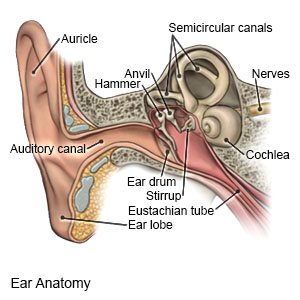Fluid in the Ear (Serous Otitis Media)
Medically reviewed by Drugs.com. Last updated on Aug 4, 2025.
AMBULATORY CARE:
Serous otitis media (SOM)
is fluid trapped in the middle of your ear behind your eardrum. This condition usually develops without signs or symptoms of an ear infection. Serous otitis media may be caused by an upper respiratory infection or allergies. It is most common in the fall and early spring.
 |
Signs and symptoms:
- Trouble hearing
- Sounds are muffled
- Plugged ear or an ear that feels full
- Ear discomfort or popping
- Ringing or buzzing in your ear
Call your doctor if:
- You develop severe ear pain.
- The outside of your ear is red or swollen.
- You have fluid coming from your ear.
- You have questions or concerns about your condition or care.
Related medications
Treatment options
The following list of medications are related to or used in the treatment of this condition.
Medicines:
You may need any of the following:
- Acetaminophen decreases pain and fever. It is available without a doctor's order. Ask how much to take and how often to take it. Follow directions. Read the labels of all other medicines you are using to see if they also contain acetaminophen, or ask your doctor or pharmacist. Acetaminophen can cause liver damage if not taken correctly.
- NSAIDs , such as ibuprofen, help decrease swelling, pain, and fever. This medicine is available with or without a doctor's order. NSAIDs can cause stomach bleeding or kidney problems in certain people. If you take blood thinner medicine, always ask your healthcare provider if NSAIDs are safe for you. Always read the medicine label and follow directions.
- Steroids help decrease inflammation so the fluid can drain from your ear.
- Antibiotics may be needed if a bacterial infection caused your SOM.
How to stay healthy:
- Wash your hands often throughout the day. Use soap and water. Rub your soapy hands together, lacing your fingers, for at least 20 seconds. Rinse with warm, running water. Dry your hands with a clean towel or paper towel. Use hand sanitizer that contains alcohol if soap and water are not available. Teach children how to wash their hands and use hand sanitizer.

- Avoid people who are sick. Some germs are easily and quickly spread through contact.
Follow up with your doctor as directed:
Write down your questions so you remember to ask them during your visits.
© Copyright Merative 2025 Information is for End User's use only and may not be sold, redistributed or otherwise used for commercial purposes.
The above information is an educational aid only. It is not intended as medical advice for individual conditions or treatments. Talk to your doctor, nurse or pharmacist before following any medical regimen to see if it is safe and effective for you.
Learn more about Fluid in the Ear
Treatment options
Care guides
Symptoms and treatments
Further information
Always consult your healthcare provider to ensure the information displayed on this page applies to your personal circumstances.
